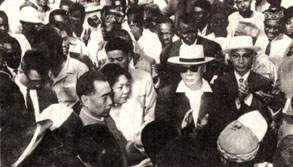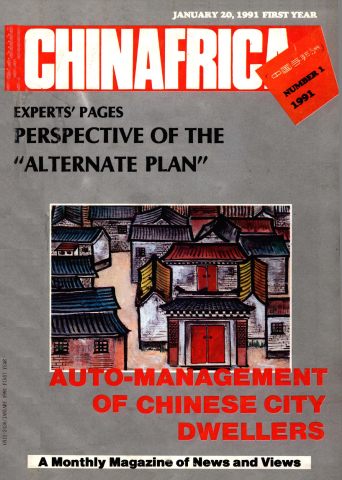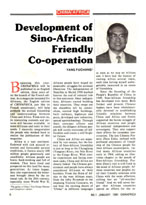Beginning this year,CHINAFRICA will be published in an English edition, three years after the launch of the French edition. As a magazine intended for Africans, the English edition of CHINAFRICA, just like its French counterpart, will help promote the mutual friendship and understanding between China and Africa. From now on, its interesting contents and pictures will become available to more Africans and cater to their needs. I sincerely congratulate the people who worked hard to realize the publication of this magazine.
Africa is a vast continent. Endowed with rich mineral resources and favourable natural conditions, it fosters nearly 600 million people generously and unselfishly. African people are brave, hard-working and full of wisdom. They have lived and prospered on this land for many generations. At times happy, they also experienced the bitterness brought about by the colonial rule. In the 20th century, especially since World War II, African people have waged indomitable struggles for national liberation. The independence of Namibia in March 1990 marked forever the end of colonial rule in this continent. Once independent, Africans started building their countries. They swept out the shambles left by colonialism, erected high buildings, built railways, highways and ports, developed new industries, spread agrotechnology. Through their constant efforts and search, the diligent African people will surely overcome all difficulties and create a still brighter future.
China and Africa are separated by vast oceans, but the history of Sino-African friendship is just as long as the Changjiang(Yangtze) River, the Nile River or the Congo River. With similar experiences and facing common tasks, China and Africa are closely linked. The Chinese government and people have always considered Africans as their brothers. From the Horn of Africa to the west African coast, from the lofty Pyramids to the imposing Victoria Cataracts, we can hear the exciting shouts of “China” in different languages as soon as we step on African soil. I have had the honour of visiting Africa several times, each time having myself unforgettably immersed in an ocean of friendship.
Since the founding of the People’s Republic of China in 1949, Sino-African friendship has developed ever more. Both former and present Chinese leaders have been wholeheartedly devoted to establishing friendly relations between China and Africa and firmly supported the heroic struggle of African countries and people for national independence and sovereignty. They also support their efforts for economic construction. The late Chinese Premier Zhou Enlai, imbued with profound sentiments of friendship of the Chinese people for their African counterparts, visited many African countries early in 1964, adding an illustrious chapter to the annals of Sino-African friendship. Premier Zhou’s visit is still fresh in the mind of African people. African countries and peoples extol their friendly relations with China with the same affection, calling her an “all-weather friend.” And we will never forget that African countries spared no efforts for the resumption of China’s legitimate seat on the United Nations.
Politically mutual respect and support is the basis of the profound friendship between China and African countries. They are different in historical background, social structure, levels of cultural and economic development. So only policies formulated by their own governments in the light of their own countries’ conditions will be correct. Proceeding from this point of view, the Chinese government always respects and supports the choices of African countries, and never interferes in their internal affairs, which is also an important principle of China’s foreign policy. For any country, it is up to the people themselves to judge whether a policy is correct and can boost the country’s development, whether the policy should be continued and perfected, or readjusted and corrected.—Such conclusions have to be arrived at through practice after various efforts and explorations. This has been proved by China’s decade-long reforms and opening to the outside, and by the experiences of many African countries in their development. Of course, it is equally important for a country to learn from other countries’ strong points. But what is more important is that in a fast changing world, there could never be a model of development which is suitable to all countries, just like there is no panacea in the world which can cure all diseases. So African countries have the right to choose their social system and road for development, according to the conditions of their specific countries.
Leaders of China and various African countries often visit each other, efficiently promoting the friendly Sino-African co-operations. Chinese leaders have visited nearly 40 African countries, while leaders from 47 African countries have visited China. All African leaders, whether founders of a nation or leaders of the new generation, attach great importance to the friendly relations between China and their countries; some like Nyerere, Kaunda, Mobutu, Bongo and Mugabe, came several times and are all old friends of the Chinese people. Moreover, whenever China is confronted with difficulties, African countries always show their sympathy, understanding and support and oppose to the interference with China’s internal affairs. At present, some large countries are exerting influences or even pressures on African countries, attaching political conditions on assistance and hawking their social systems, economic models and ideas in these countries. The Chinese government resolutely opposes such practices that interfere with the internal affairs of other countries.
The economic and technical co-operations between China and Africa have proved fruitful, promoting the development of South-South co-operation. The late premier Zhou Enlai set up eight principles for Chinese foreign assistance, commonly praised by African and other third world countries. By the end of 1989, China had signed economic and technical agreements with 44 African countries; 465 projects have been completed with the assistance of China, including the Tanzania-Zambia Railway, known as the “road of friendship.” In early 1983, in the light of a new situation and mutual needs, China set up four new principles for economic and technical cooperation with Africa—equality and mutual benefit, stress of practical results, manifold forms of co-operation, and common development. China has developed varied forms of mutually beneficial co-operation such as joint ventures, co-operative management, contractual projects and labour service cooperation. Trade relations between China and Africa also enlarged. Sino-African cooperation in education, culture and health care has also developed. China has received students from more than 40 African countries since 1956. Many of these students are playing an active role in building their own countries. China has reached agreements on cultural cooperation with more than 40 African countries. The cultural exchanges and mutual visits of art groups between China and Africa are warmly received. Since 1963, the Chinese government has sent medical groups to 40 African countries. Following the principle of “healing the wounded and rescuing the dying,” Chinese doctors have been highly praised by local people, and they have in turn learned a lot from the African people.
At present, the international situation is undergoing tremendous changes. We are glad to see the detente of East-West relations, but this detente does not bring peace to the world. New conflicts and problems occur repeatedly, the gap between north and south keeps on growing. Developing countries face a worsening international environment while the issue of peace and development have become more urgent. Facing a new challenge, China and Africa require more sympathy, support and cooperation from each other in their struggle to safeguard their independence, promote South-South co-operation and eliminate apartheid, so as to make new contributions to world peace and development. African countries represent an important force on the international stage and has a great potential for development. The international community, especially the developed large countries, should take Africa’s role and problems into full account, increase their assistance to Africa and share the responsibilities and obligations of African development.
We are happy to see that African countries and people are strengthening their unity and striving for the integration of the whole African economy, while searching for the correct road for their own development. I take this opportunity, through CHINAFRICA’s English edition, to extend my wishes for peace, development and prosperity to the African people.
January 1, 1991, Beijing.
* The author is China’s Vice-Foreign Minister and Chinafrica's advisor.

Former Premier Zhou Enlai and Foreign Minister Chen Yi during a visit to Africa in 1963-64.


 Copy Reference
Copy Reference 